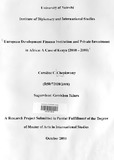| dc.description.abstract | Many African countries have undertaken reforms that have produced significant results in terms of growth and stability over the last decade. The continuation of the positive trend in economic growth is essential for poverty reduction and generally attainment of the Millennium development Goals. However, many countries are still facing many obstacles in achieving the targets of poverty reduction. Some of the poor people in Africa and the world at large believe that getting a job is the best way to escape poverty. African governments are challenged by the fact that they are not able to create jobs with the same pace as the population growth.
One of the major players in the job creation field is the Private Sector. For the sector to continue growing, it is critical to encourage investments within the private sector as it's strongly associated with economic growth. This means that if the private sector in Africa does not grow very rapidly, many of the African youths will grow up without prospects of a job. Small and medium sized enterprises (SMEs) represent the backbone of economic activity in many developing countries. But access to finance is often better for large and micro enterprises than for SMEs in developing countries.
There are enterprises with the potential to grow and create jobs but without access to the financing they need. This is where Development Finance Institutions (DFls) have played a key role in funding sustainable and profitable businesses in developing countries. DFIs are well understood in most of Europe where they have a strong track record in promoting development. However, their methods and achievements are less understood in emerging markets particularly in Africa.
This study provides an insight into the European DFIs and their countries of operation in Africa. It also highlights the various investments they have made in Africa and Kenya in particular. It puts them into the context of the sectors they invest in and their preferred financing structures and instruments. The research concludes that-the DFIs are an important pillar in the Kenyan economy especially in their contribution to the Kenya government objectives of creating jobs and growing sustainable world class businesses. | en_US |

